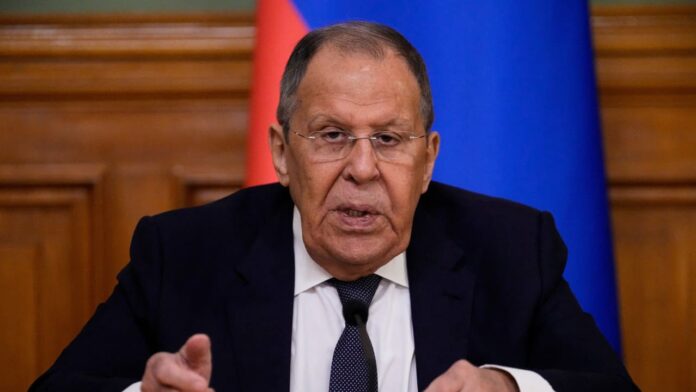Russian Foreign Minister Escalates War Rhetoric
Russian Foreign Minister Sergey Lavrov intensified Moscow’s criticism of the West on Thursday, alleging that NATO and the European Union have effectively launched a “real war” against Russia. His remarks came during a tense G20 foreign ministers’ gathering at the United Nations headquarters in New York.
Lavrov told fellow diplomats that Western nations are not only backing Ukraine but are also directly involved in the conflict. “NATO and the European Union have already declared a real war on my country and are fully engaged in it,” Lavrov claimed, arguing that the crisis in Ukraine was “provoked by the collective West.”
The statement underscored Russia’s ongoing attempt to frame the conflict as a confrontation with NATO rather than a war of aggression against Ukraine. Lavrov’s accusations were delivered just days after former U.S. President Donald Trump shifted his tone on Ukraine, insisting the country could reclaim all of its territory and dismissing Russia as a “paper tiger.”
UK Rejects Russian Allegations as “Fantasy”
Lavrov’s comments quickly drew a sharp response from Britain. U.K. Foreign Secretary Yvette Cooper strongly dismissed the accusations, labeling them as baseless propaganda.
“No amount of false distortions or fantasy narratives from the Russian side will change the truth about this war,” Cooper said while addressing G20 ministers. She accused Moscow of launching an “unprovoked war of aggression” and stressed that the international community would not be swayed by Russian disinformation campaigns.
The heated moment came as Lavrov was leaving the meeting room, with cameras capturing Cooper directly confronting the Russian diplomat. The clash highlighted deep divisions among G20 nations, particularly between Western allies and Russia, over the war in Ukraine.
Trump’s Sudden Policy Shift on Ukraine
Lavrov’s fiery rhetoric coincided with a surprising reversal from Donald Trump on the Ukraine conflict. After months of hinting that Ukraine might need to compromise and surrender territory, Trump stated earlier this week that Kyiv could “fight and win back all of Ukraine in its original form.”
In a message shared on Truth Social, Trump described Russia as a “paper tiger” and argued that Ukraine, with enough patience and NATO’s financial backing, could restore its pre-2022 borders.
According to U.S. officials, the comments mark a deliberate “strategic move” aimed at increasing pressure on Moscow. Intelligence assessments suggest Russia’s economy is weakening under sanctions, and its military progress has stalled. “Russia has been fighting aimlessly for over three years in a war that should have taken a genuine military power less than a week to complete,” Trump wrote.
Kremlin Pushes Back Against “Paper Tiger” Label

The Kremlin was quick to reject Trump’s characterization. Russian presidential spokesperson Dmitry Peskov mocked the comparison, saying, “Russia has always been seen as a bear. And there is no such thing as a paper bear.”
Despite the dismissive tone, analysts observed that Trump’s remark appears to have unsettled Russian officials. A number of state-aligned figures rushed to defend Moscow’s military reputation, suggesting that the former president’s words struck a sensitive chord.
Currently, Russian forces occupy roughly 20% of Ukraine’s territory, primarily in the eastern and southern regions. However, Western intelligence reports indicate that Russia has made minimal gains since late 2022, advancing less than 1% of Ukrainian territory in nearly two years.
Escalating Security Concerns in Eastern Europe
The diplomatic war of words comes as NATO members raise concerns over heightened Russian military activity near their borders.
On September 19, Estonia reported that three Russian MiG-31 fighter jets violated its airspace for 12 minutes, prompting Tallinn to invoke NATO’s Article 4 for urgent consultations. Meanwhile, Poland announced that it had intercepted and destroyed Russian drones that crossed into its territory earlier this month.
These incidents have amplified fears of the conflict spilling beyond Ukraine, further straining relations between NATO and Moscow.
Global Reactions and the Road Ahead
The G20 confrontation underscored the deepening divide between Russia and Western powers as the Ukraine war drags into its fourth year. While Moscow seeks to portray itself as a victim of Western hostility, NATO members remain firm that Russia is the aggressor.
Trump’s shift in rhetoric adds another layer of uncertainty, with observers questioning how his remarks might influence future negotiations or U.S. policy if he regains political influence. Meanwhile, European nations continue to stress unity, pledging to support Ukraine militarily and economically for “as long as it takes.”
As the war grinds on with no clear end in sight, moments like the heated G20 exchange illustrate the fragile state of global diplomacy—and the potential for escalating tensions between nuclear-armed adversaries.

